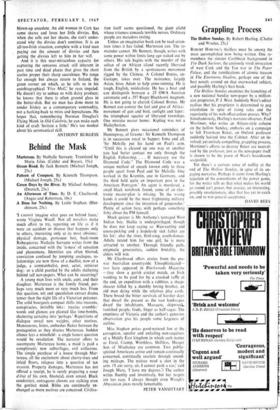Grappling Process
The Hollow Sunday. By Robert Harling. (Chalk, and Windus, 25s.) ROBERT HARI ING's thrillers must be among the most accomplished now being written. One re- members the sinister Caribbean background in The Dark Saviour, the curiously vivid invocation of west Cork and the Tan war in The Paper Palace, and the ramifications of atomic treason in The Enormous Shadow, perhaps one of the best novels around on that overworked subject, and possibly Harling's best book.
The Hollow Sunday examines the launching of a new national Sunday newspaper by a million- aire proprietor, P. J. West. Suddenly West's editor realises that his proprietor is determined to peg circulation in spite of rising sales and the superiority of his web-offset colour presses. Why? Simultaneously, Harling's narrator-observer, Paul Mortimer, who writes an Atticus-style column on the hollow Sunday, embarks on a campaign to fell Frensham Baker, an Oxford professor suddenly hoisted into the Cabinet. After an in- volved, yet entirely compelling, grappling process, Mortimer's efforts to destroy Baker are neutral- ised by the professor, just as the newspaper itself is shown to be the pawn of West's boardroom realpolitik.
Yet there's a curious sense of nullity at the end of The Hollow Sunday, in spite of its en- gaging narrative. Perhaps it stems from Harling's rejection of the conventions of the power game, for the writer tells us that what makes his world go round isn't power, but avarice, an interesting, possibly revolutionary, idea that has yet to catch on, and to win general acceptance.
DAVID REES






























 Previous page
Previous page